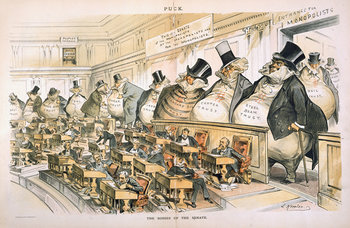|
| |
Regulatory capture is a form of government failure that occurs when a regulatory agency acts to secure the commercial or political interests of the industry it is charged with regulating. This can cause inefficiencies and risks that reduce quality of life for a nation.
In many cases, regulatory capture results from bribery, revolving doors, political donations and corruption that allow regulators to realize material profits from the industry they are supposed to be regulating. In other cases, regulatory capture involves no exchange of money. For example, an industry may offer to make the regulator's job easier by designing strategies and performing analysis for them. Regulatory capture can also be social in nature whereby an industry sends charming people to befriend the employees of a regulatory agency. Generally, it is healthy for a regulatory agency to have a somewhat adversarial relationship with the target of regulations. Close and comfortable relationships can be a sign of regulatory capture. Other signs are a lack of enforcement actions, a weakening of rules or a move to industry self regulation. Any financial links between the employees of a regulatory agency and regulated industries can also be a sign of capture. This includes offers of employment.
Regulatory capture can damage public interests in areas such as health, safety, the environment, economy, education, transportation, infrastructure and quality of life.|
Type | | Definition | A regulator who is unduly influenced by the industry or organizations that it is supposed to be regulating. | Common Types | BriberyRevolving doorsPolitical donationsCognitive influenceSocial influenceOffers of help that make a regulator's job easier | Example Solutions | Regulations & LawsWhistleblowersAudits & InvestigationsRegulatory reorganizations Performance managementGovernance bodiesComplaints processesThird party monitoring by journalists and non-profit organizations | Related Concepts | |
Business Ethics
This is the complete list of articles we have written about business ethics.
If you enjoyed this page, please consider bookmarking Simplicable.
A few examples of conflict of interest.
An overview of Chinese walls as a compliance tool.
An overview of self-dealing with examples.
An overview of perverse incentives.
The definition of duty with examples.
The definition of crony capitalism with examples.
An overview of cronyism with an illustrative example.
The definition of dual agency with examples.
The definition of professional ethics with examples.
Simplicable is a modern encyclopedia that has been updated daily since 2010.
A list of interesting business theories.
A definition of knowledge work with examples.
A list of social processes, absurdities and strategies related to office politics.
A guide to product development.
The differences between types of knowledge.
An overview of the trough of sorrow.
A list of common business models.
A list of key marketing strategies.
A few sources of competitive advantage for businesses.
TrendingThe most popular articles on Simplicable in the past day.
Recent posts or updates on Simplicable.
Site Map
© 2010-2023 Simplicable. All Rights Reserved. Reproduction of materials found on this site, in any form, without explicit permission is prohibited.
View credits & copyrights or citation information for this page.
|































